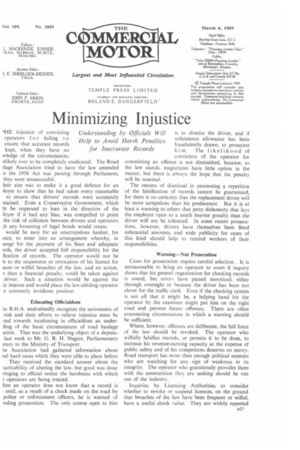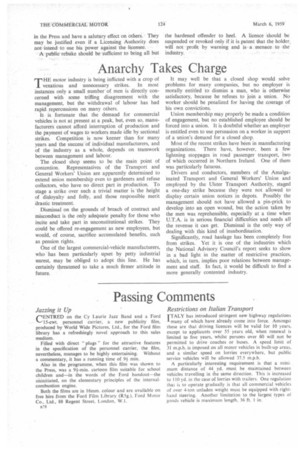Minimizing Injustice
Page 31

Page 32

If you've noticed an error in this article please click here to report it so we can fix it.
IFIE injustice of convicting operators f o r failing t o ensure that accurate records kept, when they have no wledge of the circumstances, nlikely ever to be completely eradicated. The Road tlage Association tried to have the law amended n the 1956 Act was passing through Parliament, they were unsuccessful.
heir aim was to make it a good defence for an rloyer to show that he had taken every reasonable to ensure that drivers' records were accurately Rained. Even a Conservative Government, which ht be supposed to lean hi the direction of the Toyer if it had any bias, was compelled to point the risk of Collusion between drivers and operators ;ft any loosening of legal bonds would create.
would be easy for an unscrupulous haulier, for ince, to enter into an arrangement whereby, in iange for the payment of his fines and adequate irds, the driver accepted full responsibility for the fication of records. The operator would not be le to the suspension or revocation of his licence for uent or wilful breaches of the law, and no action, r than a financial penalty, could be taken against driver. Such a situation would be against the ic interest and would place the law-abiding operator n extremely invidious position.
ducating Officialdom he R.H.A. undoubtedly recognize the seriousness of Tisk and their efforts to relieve injustice must be :..ted towards inculcating in officialdom an underding of the basic circumstances of road haulage ation. That was the underlying object of a deputalast week to Mr. G. R. H. Nugent, Parliamentary etary to the Ministry of Transport.
he Association had gathered information about ral hard cases which they were able to place before They received the standard answer about the .acticability of altering the law, but good was done ringing to official notice the harshness with which operators are being treated.
hen an operator does not know that a record is until, as a result of a check made on the road by police or enforcement officers, he is warned of nding prosecution. The only course open to him is to dismiss the driver, and if subsistence allowance has been fraudulently drawn, to prosecute him. The likelihood of conviction of the operator for committing an offence is not diminished, because, as the law stands, magistrates have little option in the matter, but there is always the hope that the penalty will be nominal.
The success of dismissal in preventing a repetition of the falsification of records cannot be guaranteed, for there is no certainty that the replacement driver will be more scrupulous than his predecessor. But it is at least a warning to others that petty dishonesty that lays the employer open to a much heavier penalty than the driver will not be tolerated. In some recent prosecutions, however, drivers have themselves been fined substantial amounts, and wide publicity for cases of this kind should help to remind workers of their responsibilities.
Warning—Not Prosecution Cases for prosecution require careful selection. It is unreasonable to bring an operator to court if inquiry shows that his general organization for checking records is sound, but errors have passed unnoticed, either through oversight or because the driver has been too clever for the traffic clerk. Even if the checking system is not all that it might be, a helping hand for the operator by the examiner might put him on the right road and prevent future offences. There are often extenuating circumstances in which a warning should be sufficient.
Where, however, offences are deliberate, the full force of the law should be invoked. The operator who wilfully falsifies records, or permits it to be done, to increase his revenue-earning capacity at the expense of public safety and of his competitors deserves no mercy. Road transport has more than enough political enemies who are watching for any sign of weakness in its integrity. The operator who gratuitously provides them with the ammunition they are seeking should be run out of the industry.
Inquiries by Licensing Authorities to consider whether to revoke or suspend licences, on the ground that breaches of the law have been frequent or wilful, have a useful shock value: They are widely reported in the Press and have a salutary effect on otheri. They may be justified even if •a Licensing Authority does not 'intend to use his power against the licensee.
A public rebuke should be sufficient to bring all but the hardened offender to heel. A licence 'should be suspended or revoked only if it is patent that the holder, will not profit by warning and is a menace to the industry.




















































































































